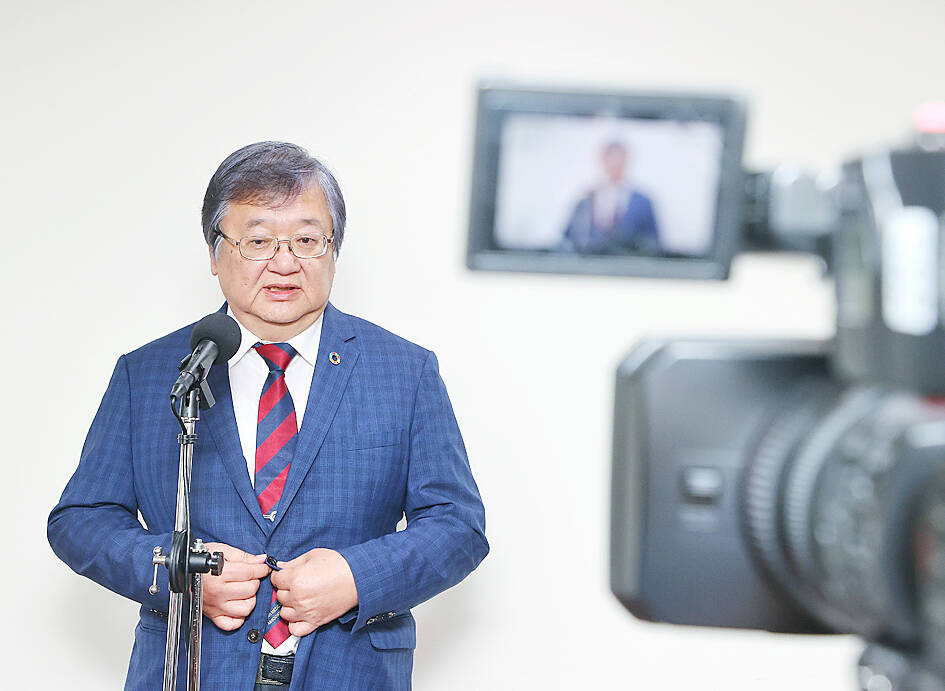Taiwan has continuously participated in international health affairs and shared its experiences, including its globally benchmarked universal healthcare coverage, and the WHO should include Taiwan in its meetings and mechanisms, Minister of Health and Welfare Chiu Tai-yuan (邱泰源) said in an op-ed published in an Israeli newspaper on Tuesday.
The 78th World Health Assembly (WHA) — the decisionmaking body of the WHO — is to be held in Geneva, Switzerland, from May 19 to May 27, but Taiwan has been excluded from the WHA in previous years due to pressure from China.
In an effort to gain international recognition and participation in the WHA, Chiu submitted his opinion piece, titled “Recognizing Taiwan’s considerable contributions to global health and potential at the WHO,” to the English-language Jerusalem Post and it was published on Tuesday.

Photo: CNA
Citing the WHO Fourteenth General Programme of Work for 2025-2028, adopted by WHO members at last year’s WHA, Chiu said the program’s strategic objectives include improving healthcare and bolstering financial protections to ensure universal healthcare coverage.
NHI SYSTEM NO. 1
Taiwan launched the National Health Insurance (NHI) system in 1995, and it now covers 99.9 percent of the population, providing equitable, accessible and efficient healthcare to all people, he said, adding the NHI system is an important pillar and guarantor of Taiwan’s social stability, and people’s health and safety, and has become a global benchmark of universal healthcare coverage.
Citing an annual survey by Internet database Numbeo, Chiu said Taiwan has been ranked first in the Healthcare Index category for seven consecutive years.
In line with President William Lai’s (賴清德) vision of a “healthy Taiwan,” the government is expanding health promotion operations and preventive healthcare, implementing a family physician program, utilizing telemedicine, and promoting integrated long-term care and palliative care, to ensure “holistic, lifelong, and dignified care for all people, realizing health equity,” he said.
The minister also outlined the use of information and communications technology to improve healthcare systems and services, including the NHI Cloud, adoption of international standards for medical data sharing, artificial intelligence-assisted smart healthcare, the virtual health insurance card, and the introduction of the Health Technology Assessment to facilitate evidence-based policymaking.
PANDEMIC ASSISTANCE
Detailing Taiwan’s role in sharing supplies, strategies and experiences during the COVID-19 pandemic, as well as sharing its experiences in universal coverage, financial management and digital health, Chiu said that “Taiwan has continuously participated in international health affairs and has been dedicated to supporting the global health system.”
He said that while global cooperation has become essential to addressing various health crises, Taiwan has been excluded from the WHO due to China’s distortion of UN Resolution 2758 and WHA Resolution 25.1 — neither of which mentions Taiwan.
“To uphold the core UN values of inclusiveness and universality, we urge WHO and all relevant parties to recognize Taiwan’s considerable contributions to global public health and the human right to health,” Chiu said.
Taiwan should be included in the WHA and all WHO meetings, activities and mechanisms, particularly those concerned with the WHO pandemic agreement, he said, adding that Taiwan hopes to work with the international community to create a fundamental human right to health, and the UN vision of leaving no one behind.
Separately, the Capital Times, a weekly newspaper in Wisconsin, on Sunday also published a letter by Dennis Lei (類延峰), director-general of the Taipei Economic and Cultural Office in Chicago, urging the WHO to recognize Taiwan’s contributions to global health and allow its participation in the WHO.

Eight restaurants in Taiwan yesterday secured a one-star rating from the Michelin Guide Taiwan for the first time, while three one-star restaurants from last year’s edition were promoted to two stars. Forty-three restaurants were awarded one star this year, including 34 in Taipei, five in Taichung and four in Kaohsiung. Hosu (好嶼), Chuan Ya (川雅), Sushi Kajin (鮨嘉仁), aMaze (心宴), La Vie by Thomas Buhner, Yuan Yi (元一) and Frassi in Taipei and Front House (方蒔) in Kaohsiung received a one-star rating for the first time. Hosu is known for innovative Taiwanese dishes, while Chuan Ya serves Sichuan cuisine and aMaze specializes

Taitung County is to launch charter flights to Malaysia at the end of this year, after setting up flights to Vietnam and Thailand, the Taitung County Government said yesterday. The new charter flight services, provided by low-cost carrier Batik Air Malaysia, would be part of five-day tour packages for visits to Taitung County or Malaysia. The Batik Air charter flight, with about 200 seats, would take Malaysian tourists to Taitung on Dec. 30 and then at 12:35pm return to Kuala Lumpur with Taiwanese tourists. Another charter flight would bring the Taiwanese home on Jan. 3 next year, arriving at 5:30pm, before taking the

Taiwan High Speed Rail Corp. (THSRC) plans to ease strained capacity during peak hours by introducing new fare rules restricting passengers traveling without reserved seats in 2026, company Chairman Shih Che (史哲) said Wednesday. THSRC needs to tackle its capacity issue because there have been several occasions where passengers holding tickets with reserved seats did not make it onto their train in stations packed with individuals traveling without a reserved seat, Shih told reporters in a joint interview in Taipei. Non-reserved seats allow travelers maximum flexibility, but it has led to issues relating to quality of service and safety concerns, especially during

An exhibition celebrating Taiwan and Japan’s comic culture opened on Saturday in Taichung, featuring a section that explores Taiwanese reproductions of Japanese comics from when martial law limited Japanese representation. “A Century of Manga Culture: An Encounter of Taiwan and Japan’s Youth” held its Taiwan opening ceremony at Taichung’s National Taiwan Museum of Comics after an initial one-month run in Japan’s Kyoto International Manga Museum between May 24 and June 24. Much like the Kyoto exhibition, the show mainly celebrates the comic connection between Taiwan and Japan through late Taiwanese comic book